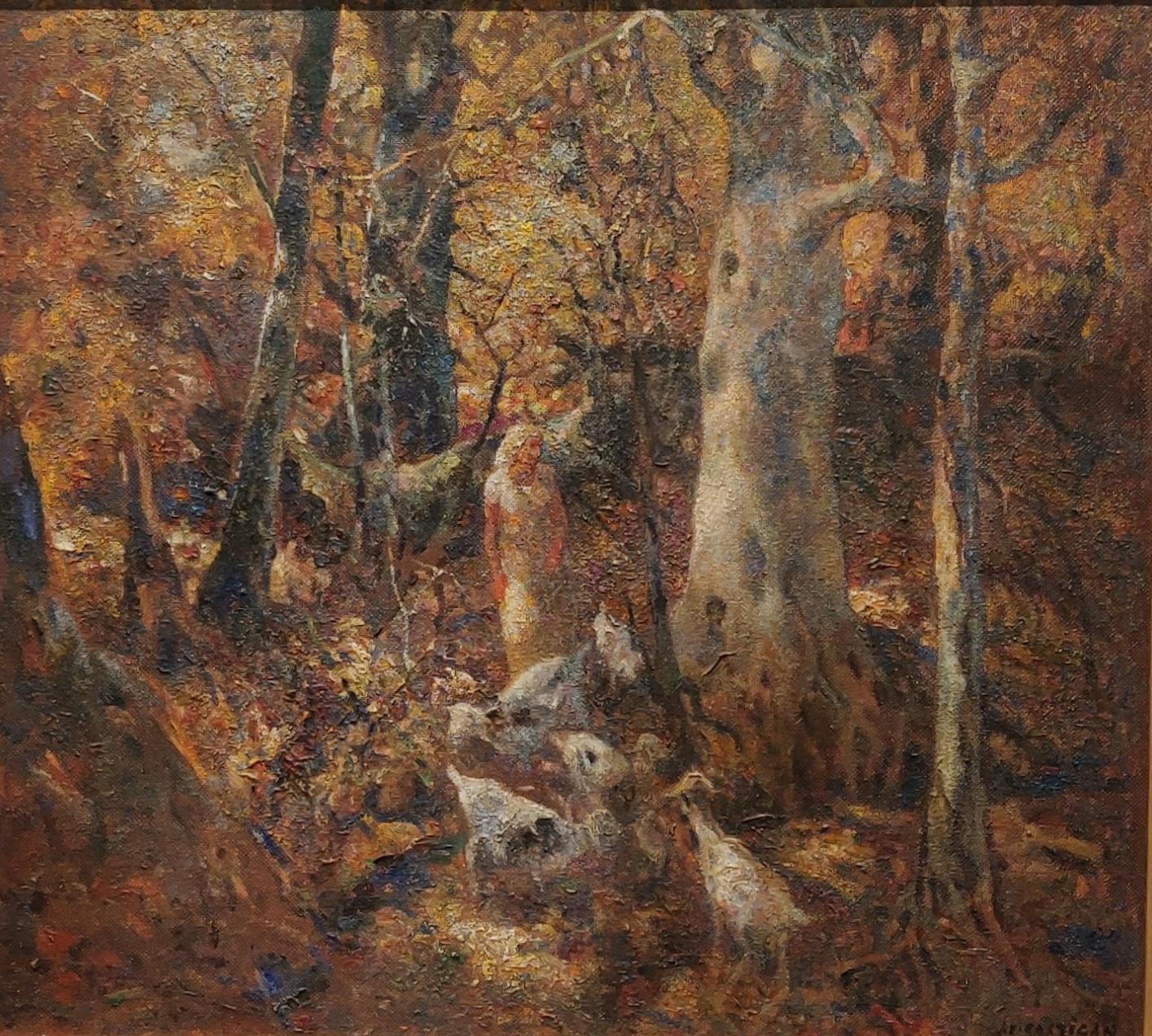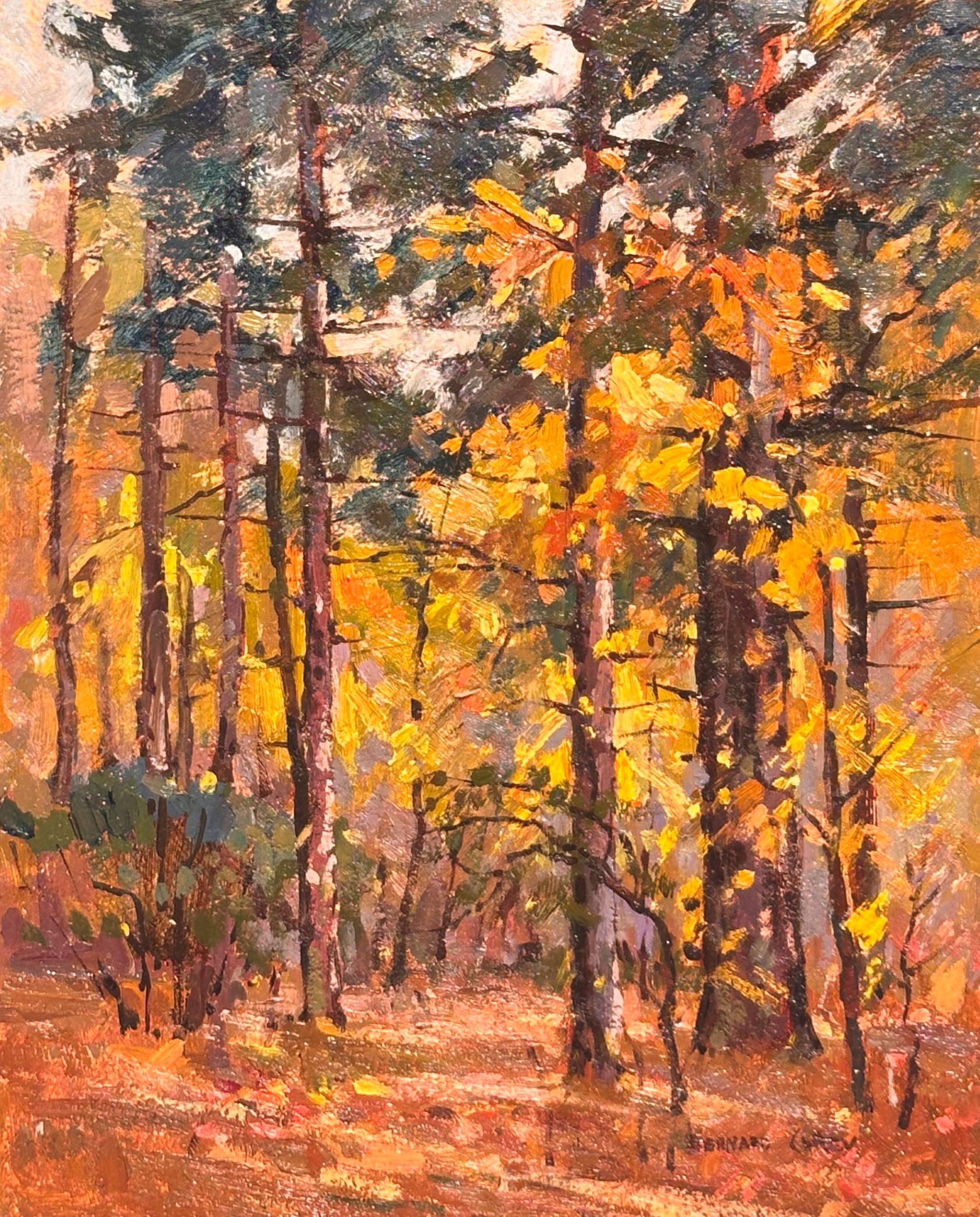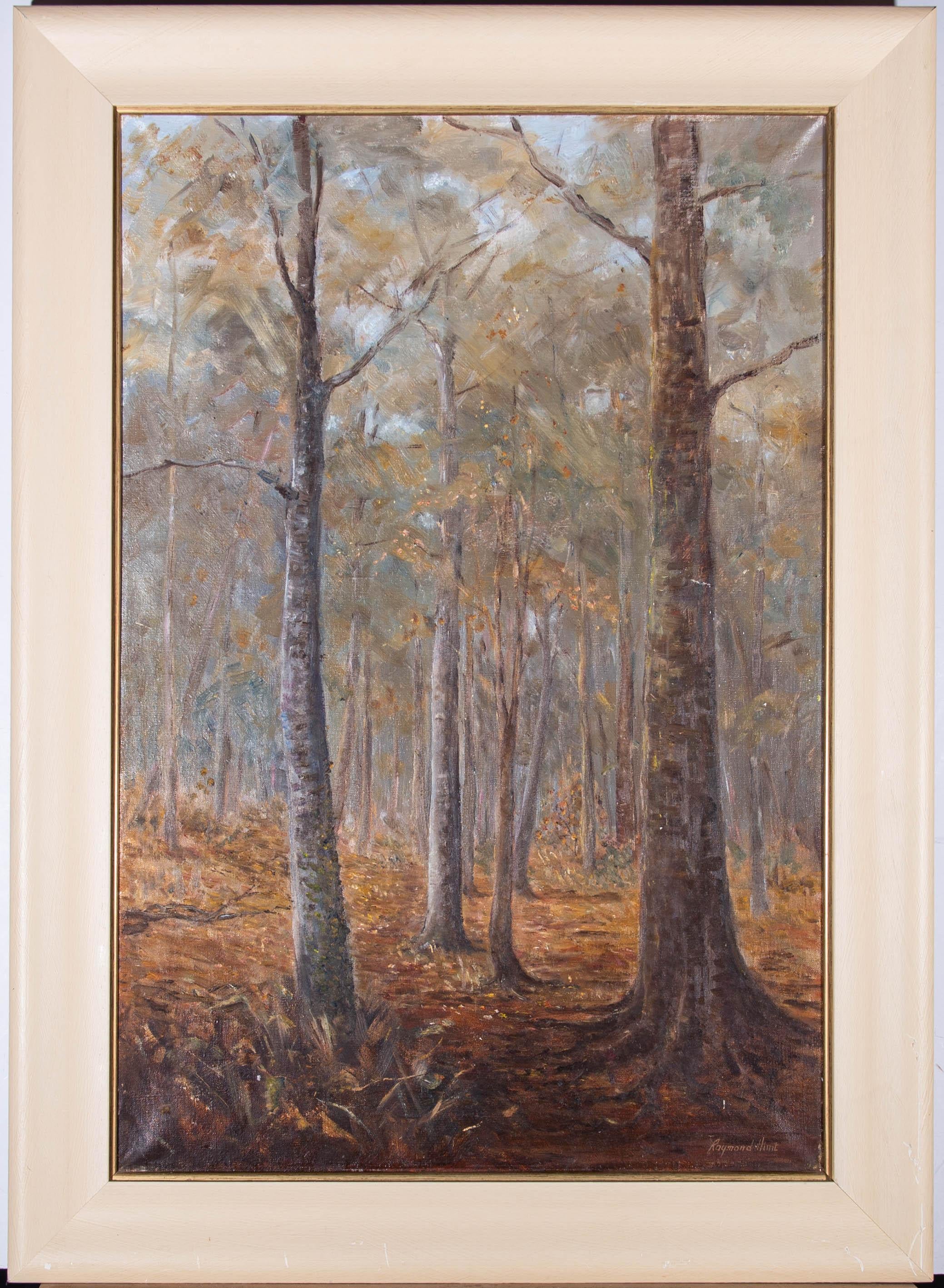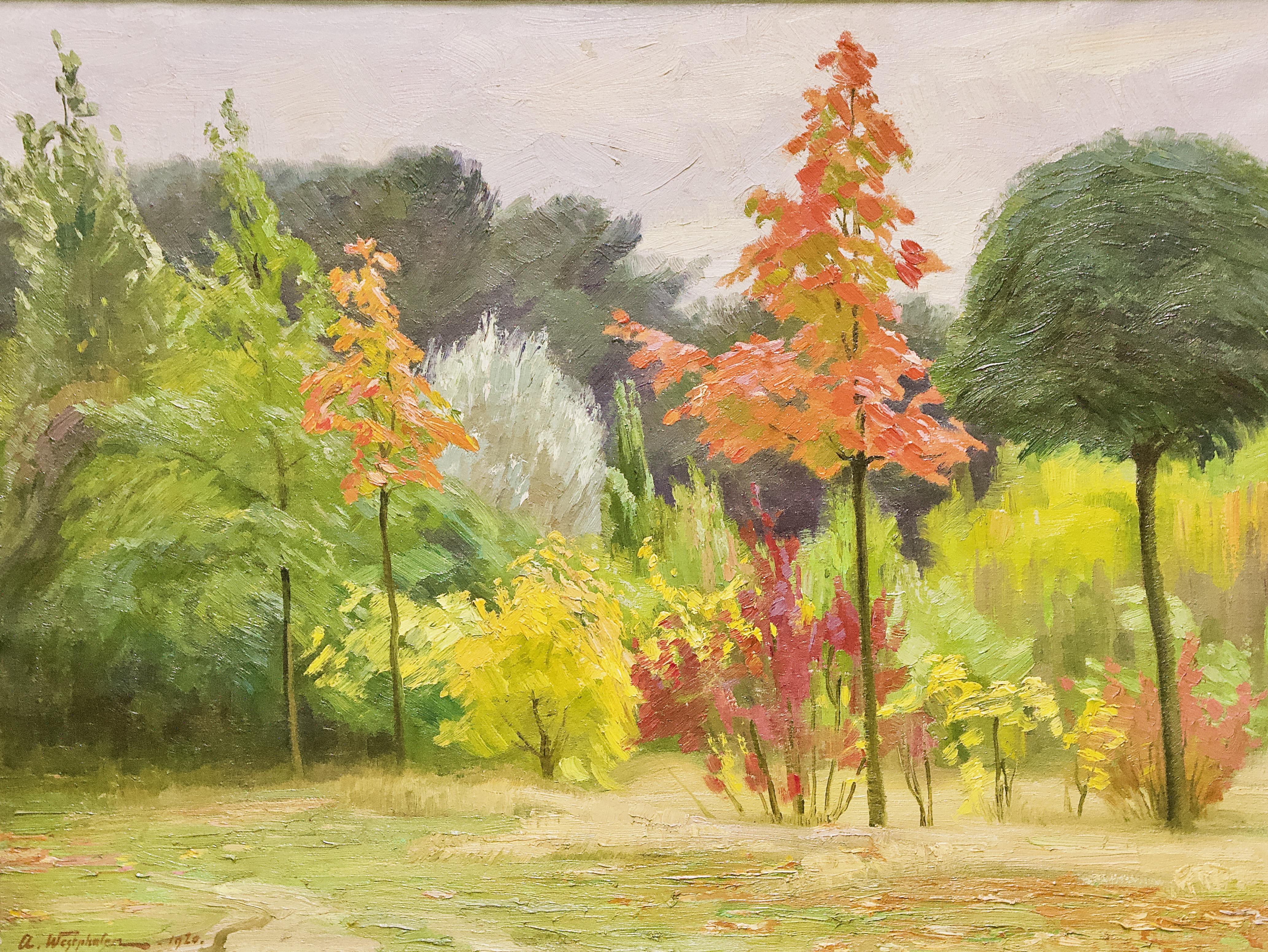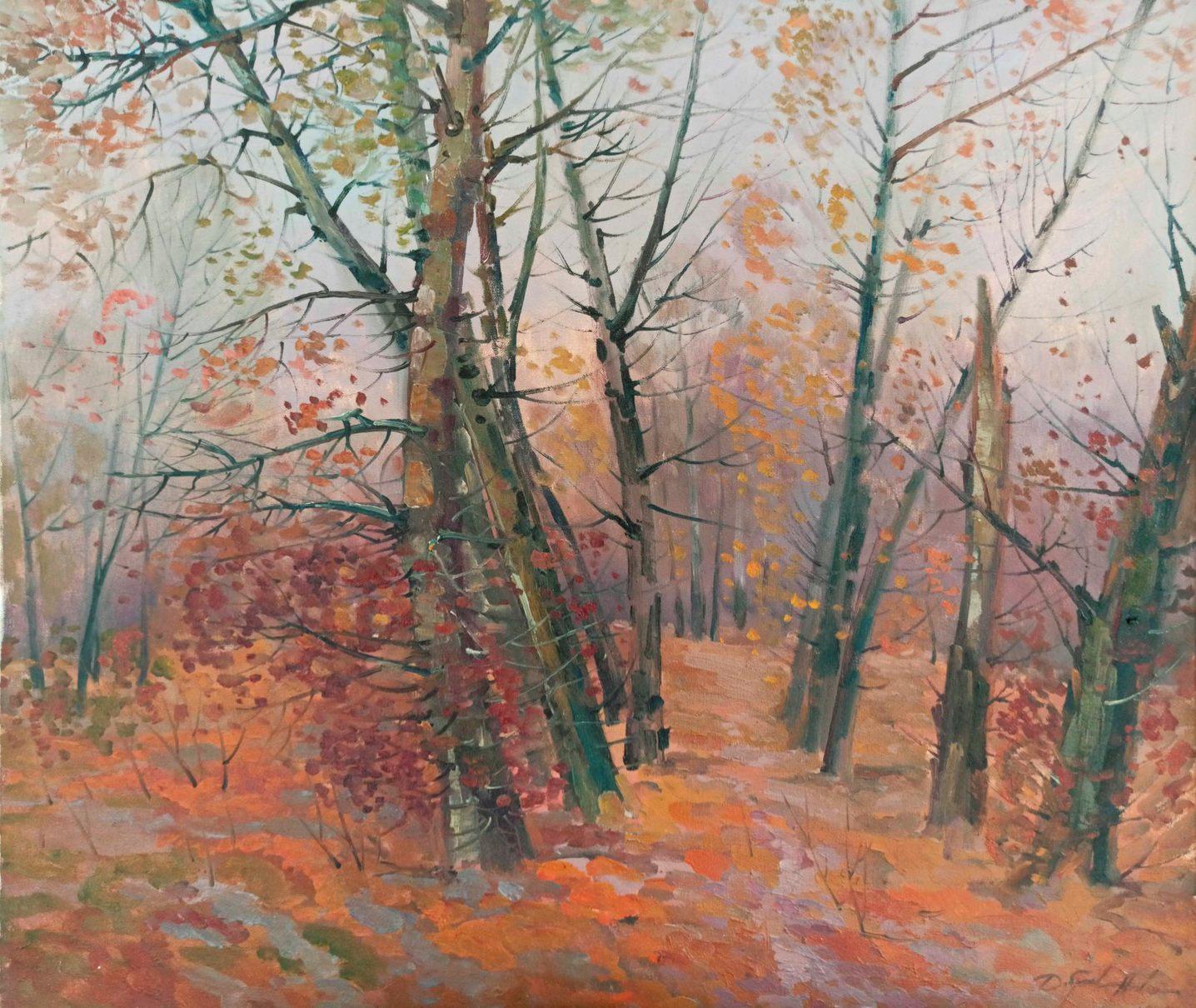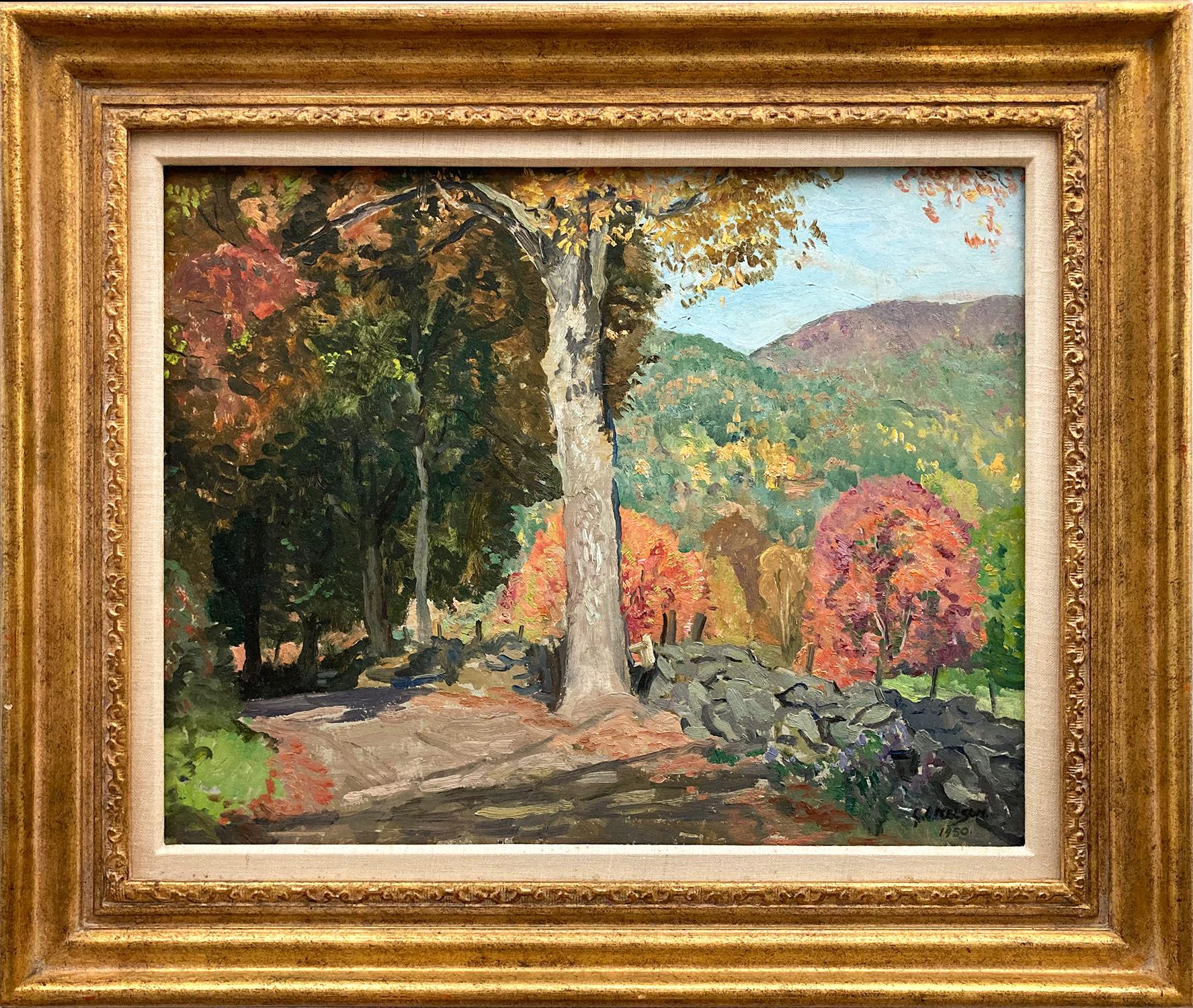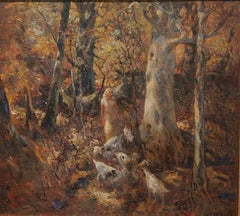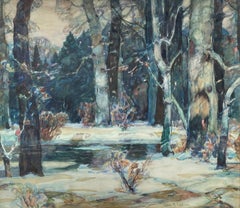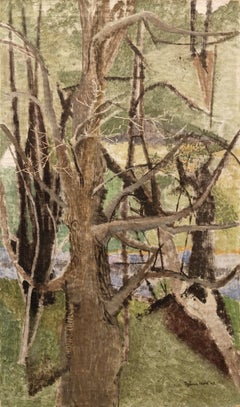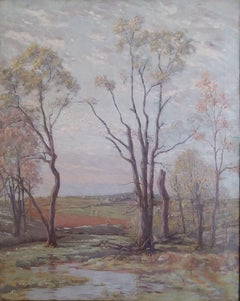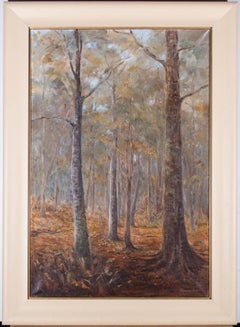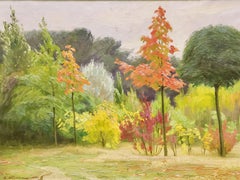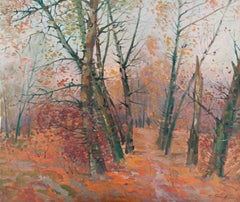Items Similar to "Autumn Wood Interior" John E. Costigan, Early 20th Century Landscape Painting
Want more images or videos?
Request additional images or videos from the seller
1 of 11
John E. Costigan"Autumn Wood Interior" John E. Costigan, Early 20th Century Landscape Painting1946
1946
$19,200
$24,00020% Off
£14,679.42
£18,349.2820% Off
€16,907.73
€21,134.6620% Off
CA$26,905.09
CA$33,631.3620% Off
A$30,037
A$37,546.2520% Off
CHF 15,738.94
CHF 19,673.6720% Off
MX$367,682.35
MX$459,602.9420% Off
NOK 199,884.64
NOK 249,855.8120% Off
SEK 188,465.84
SEK 235,582.3020% Off
DKK 126,184.12
DKK 157,730.1520% Off
Shipping
Retrieving quote...The 1stDibs Promise:
Authenticity Guarantee,
Money-Back Guarantee,
24-Hour Cancellation
About the Item
John Edward Costigan
Autumn Wood Interior, 1946
Signed, lower left "J.E. Costigan N.A."
Oil on canvas
24 x 30 inches
John Costigan was a self-taught painter and trained printer distinguished by his impressionistic style and affinity for bucolic scenes. Born on February 29, 1888, in Providence, Rhode Island he was orphaned in adolescence. Costigan was taken in by his aunt and uncle, vaudeville performers Helen and Jeremiah Cohan. He began working as an errand boy and afterward held jobs in local costume jewelry factories. In 1903, Costigan moved to New York City through the assistance of his aunt and uncle, who obtained a position for him with the H.C. Miner Lithographing Company. There he resided in a theatrical boarding house and attended rehearsals for the works of his playwright cousin, George M. Cohan. The Miner Company produced posters for such theatrical works. Though Costigan began as a pressroom helper, through his twenty-eight year employment with the company he learned about printing through apprenticeships, and began applying his artistic talent professionally. Once promoted to sketch artist, Costigan worked designing posters for the Ziegfeld Follies, as well as silent pictures like D.W. Griffith’s Birth of a Nation.
Costigan’s formal art instruction was limited to a few weeks at the Art Student’s League where he studied under William Merritt Chase and George Bridgman. He stayed committed instead to a studio on 14th Street called the Kit Kat Club, where illustrators and newspaper artists spent nights sketching from live models in an informal atmosphere. By the age of thirty, Costigan exhibited at the Corcoran Gallery of Washington D.C., in addition to the MacDowell Club, and Babcock Gallery in New York. The year following his showing at the Babcock Gallery Costigan joined the army as a private and served in World War I. During his 1918-1919 service he experienced action while positioned in France with the 52nd “Pioneer” Infantry Division.
Costigan married sculptor and professional artist’s model Ida Blessin in 1919, and the couple retreated to Orangeburg, New York. A twenty-five mile distance from New York City, Orangeburg was situated by the Hudson River. The same area had served as a destination for Costigan’s weekend sketch trips in previous years. Through the twenties, Costigan gained greater recognition with a number of exhibitions, including showings at the Art Institute of Chicago, Salmagundi Gallery and Corcoran Gallery. An influx of awards for his work in oil and watercolor helped secure his notoriety, beginning in 1920 with an award from the National Academy of Design. In 1928, Costigan was made an Academician to the National Academy of Design, leading him to add the distinction of “N.A.” (National Academy) to his signature.
As Costigan continued to exhibit and receive awards in painting and printing, he also remained reliant on outside work. After the close of the Miner Company, Costigan taught at the Art Students League and in his Orangeburg home, found employment in a defense plant as a machine operator during World War II, and took up commercial work illustrating McCall’s Bluebook magazine for five years. Nevertheless, during the 1940s he exhibited at both the Whitney Museum of American Art and the Carnegie Institute. Costigan’s place in the fine art world was reaffirmed in 1968 with the launch of a retrospective exhibition from the Smithsonian Institute. This exhibit was comprised of works in Costigan’s varied mediums, provided by a range of public and private collections across the country. After premiering at the Paine Art Center and Arboretum in Oshkosh, Wisconsin, the Smithsonian Institute facilitated the national circulation of the works.
Costigan’s body of work across the mediums of oil, watercolor, etching, and lithography provide an extensive exploration of the pastoral, yet also document the realities of the artist’s rural life. Family members served as models for his scenes, with wife Ida a primary model for the solitary women and motherly figures. His five children, too, and later grandchildren, were influential in providing a basis for many compositions. Despite these ties to specifications of time and biographical experience, Costigan’s scenes are also outside of time, in the peaceful and somewhat utopian world of the pastoral. Cositgan gave an inspired, energetic approach to the simple joys of the bucolic, offering reflection and solace in his subjects. The strong sense of movement developed through a varied palette and the handling of light, line, and composition fills the works with vitality. The rustic figures hold an equal weight with their surroundings, with the two bound together by the artist’s bold rendering of light and color. From muted forest scenes to opulent beachside settings, Costigan developed luminescent and highly sensitive scenes of domesticity and repose. The atmospheric qualities of the works develop a sense of gravity across scenes of bathers, mothers with children, and single introspective figures, as well as his non-figural landscape and still-life subjects.
Costigan continued to paint into his eighties, even as his eyesight began to fail. He died from pneumonia at the age of eighty-four on August 5, 1972, in Nyack, New York. Prior to his death he was honored through the Artist’s Fellowship with the Benjamin West Clinedinst Medal in acknowledgement of the achievements of his half-century long career. Costigan’s self-cultivated personal vision produced an impressive body of work, offering imaginative executions of the simple moments from domestic and rural life.
- Creator:John E. Costigan (1888 - 1972, American)
- Creation Year:1946
- Dimensions:Height: 32.5 in (82.55 cm)Width: 39 in (99.06 cm)
- More Editions & Sizes:Unique Piece Price: $24,000
- Medium:
- Movement & Style:
- Period:
- Condition:
- Gallery Location:New York, NY
- Reference Number:1stDibs: LU1841214416712
About the Seller
5.0
Platinum Seller
Premium sellers with a 4.7+ rating and 24-hour response times
Established in 2022
1stDibs seller since 2022
115 sales on 1stDibs
Typical response time: <1 hour
- ShippingRetrieving quote...Shipping from: New York, NY
- Return Policy
Authenticity Guarantee
In the unlikely event there’s an issue with an item’s authenticity, contact us within 1 year for a full refund. DetailsMoney-Back Guarantee
If your item is not as described, is damaged in transit, or does not arrive, contact us within 7 days for a full refund. Details24-Hour Cancellation
You have a 24-hour grace period in which to reconsider your purchase, with no questions asked.Vetted Professional Sellers
Our world-class sellers must adhere to strict standards for service and quality, maintaining the integrity of our listings.Price-Match Guarantee
If you find that a seller listed the same item for a lower price elsewhere, we’ll match it.Trusted Global Delivery
Our best-in-class carrier network provides specialized shipping options worldwide, including custom delivery.More From This Seller
View All"Through the Woods" John E. Costigan, Early 20th Century Landscape Painting
Located in New York, NY
John Edward Costigan
Through the Woods
Signed lower right
Oil on masonite
30 x 27 1/2 inches
John Costigan was a self-taught painter and trained printer distinguished by his impres...
Category
Mid-20th Century Landscape Paintings
Materials
Canvas, Oil
"Forest Landscape" John F. Carlson, circa 1925 American Impressionist Landscape
By John F. Carlson
Located in New York, NY
John F. Carlson
Forest Landscape, circa 1925
Signed lower right
Watercolor on paper
Sight 21 x 24 1/2 inches
The native Sweden John Fabian Carlson became a household name in New Yo...
Category
1920s American Impressionist Landscape Paintings
Materials
Paper, Watercolor
"Stick Season" Sylvia Wald, 1948 Abstracted Wooded Landscape Painting
Located in New York, NY
Sylvia Wald
Stick Season, 1948
Signed and dated lower right
Oil on canvas
40 x 25 inches
Born in Philadelphia, Sylvia Wald studied at the Philadelphia Sc...
Category
1940s Abstract Expressionist Abstract Paintings
Materials
Canvas, Oil
"Springtime Landscape" William Anderson Coffin, American Impressionism Barbizon
By William Anderson Coffin
Located in New York, NY
William Anderson Coffin (1855 - 1925)
Springtime Landscape, circa 1910
Oil on canvas
30 x 24 inches
Signed lower right
Landscape and figure painter William Anderson Coffin was born...
Category
1910s American Impressionist Landscape Paintings
Materials
Oil, Canvas
"Autumn Landscape, " Bruce Crane, Tonalist American Impressionist Fall Scene
By Bruce Crane
Located in New York, NY
Bruce Crane (1857 - 1937)
Autumn Landscape
Oil on canvas
25 x 30 inches
Signed lower right
Robert Bruce Crane was an American painter. He joined the Lyme Art Colony in the early 190...
Category
Early 20th Century Tonalist Landscape Paintings
Materials
Canvas, Oil
"Autumn Landscape" Bruce Crane, Bright Orange, Luminous, Tonalist Fall Scene
By Bruce Crane
Located in New York, NY
Bruce Crane
Autumn Landscape
Signed lower right
Oil on canvas
16 x 24 inches
Bruce Crane Was born in New York City, he studied with Alexander H. Wyant before attending the Art Stud...
Category
1910s American Impressionist Figurative Paintings
Materials
Canvas, Oil
You May Also Like
New England Autumn Forest Landscape by Bernard Corey – American Impressionist
By Bernard Corey
Located in Rockport, MA
This richly textured oil painting by American impressionist Bernard Corey captures the golden beauty of a forest in autumn. With warm, dappled light filtering through tall pines and ...
Category
20th Century American Impressionist Landscape Paintings
Materials
Oil
Raymond Hunt - 20th Century Oil, Autumn Woodland
Located in Corsham, GB
An atmospheric woodland scene showing the oranges and browns of the forest floor in Autumn. The artist has signed to the lower right and the painting has been presented in a simple c...
Category
21st Century and Contemporary Landscape Paintings
Materials
Oil
$301 Sale Price
20% Off
Antique Autumn Landscape, 1920. Oil Painting by August Westphalen.
Located in Berlin, DE
Antique autumn landscape, 1920. Oil painting by August Westphalen.
Dimensions without frame.
Frame may have minor damage in places.
Category
20th Century Impressionist Landscape Paintings
Materials
Canvas, Oil
$1,890 Sale Price
20% Off
Autumn Forest, Landscape Impressionism Original oil Painting, Ready to Hang
Located in Granada Hills, CA
Artist: Peter Tovpev
Work: Original oil painting, handmade artwork, one of a kind
Medium: Oil on Canvas
Year: 2023
Style: Impressionism
Title: Autumn Forest
Size: 27.5" x 31.5" x 0...
Category
2010s Impressionist Landscape Paintings
Materials
Canvas, Oil
"Autumn" Colorful Mid-20th Century American Oil Painting Landscape with Tress
Located in New York, NY
A wonderful depiction of an Autumn landscape in Kent, Connecticut from the Mid-20th Century with puffed trees by the country side. For this beautiful depiction, we find distinct elements that are unique to the earlier works of George Lawrence...
Category
1950s American Impressionist Landscape Paintings
Materials
Oil, Board, Canvas
Antique American Impressionist Sunlit Forest Interior Rare Original Oil Painting
By Richard Kruger
Located in Buffalo, NY
Antique American impressionist landscape oil painting . Oil on canvas, circa 1910. Signed. Displayed in a period giltwood frame. Image, 16"L x 20"H.
Category
Early 1900s Impressionist Landscape Paintings
Materials
Canvas, Oil
More Ways To Browse
E M Washington
American Pastoral Landscape
Miles Impressionist
1928 Jewelry Vintage
Landscapes Oil Artist H Hudson
C Babcock
William Griffiths
Vintage Premier Designs Jewelry
Wisconsin Poster
Ziegfeld Follies
Vintage Ziegfeld Follies
Bound Newspaper
Providence Vintage Jewelry
W C Griffiths
Joy Division Poster
Vintage Forest Service Posters
John Morning
Prairie Landscape Art
